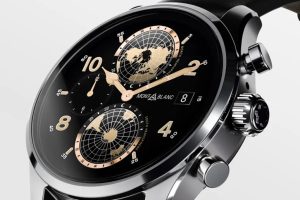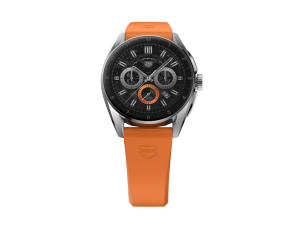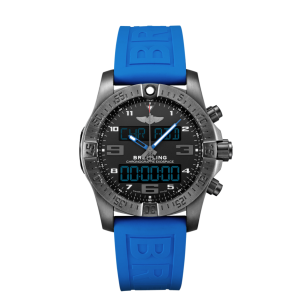
Smartwatches are not exiting the luxury timepiece segment anytime soon. Looking at some of this year’s releases, brands are indeed successful in marrying tradition with technology.
The luxury watch industry is as traditional as it comes. Watchmakers hold on to a heritage that can often span more than a century. Yet, they are not afraid to innovate and embrace new technologies – case in point being smartwatches.
The initial thought is that these “gadgets” are competitors to mechanical watches.
However, we have seen some of the most prominent names in horology coming up with their own smartwatches.
Take for example, Montblanc’s Summit 3. It offers the luxury feel of a traditional watch, but with features such as heart rate and blood oxygen tracking, Google Assistant, and access to the Google Play Store to download apps.
Of course, who can forget Tag Heuer?
The brand was among one of the first high-end Swiss brands to launch a smartwatch back in 2015 – and this year, a fourth-generation model was released: the Connected Calibre E4.
Breitling is another pioneer in this sense. Its Exospace B55 is still a talked about smartwatch – seven years or so after it was launched.
When Tech Meets Tradition
The Summit 3 is an example where a watchmaker is able to find balance between time-honoured tradition and the latest technology. Montblanc used premium materials to fashion this smartwatch.
It has a clean and classic look, with the crown and pushers repurposed for digital uses – either for launching an app or – when programmed – to execute another function.
The titanium case comes in three options: grey, black and bicolour. As for the strap, wearers can switch between calf leather and rubber.
Of course, when it comes to the face, like most smartwatches, it can be changed to suit different tastes.

The Summit 3 has a lifelike digital dial, not much distinguishable from a mechanical watch, Photo – Montblanc
To further mimic the look and feel of mechanical watches, the Summit 3 offers designs inspired by some of Montblanc’s well-loved timepieces such as the Geosphere, Boheme and 1858.
Function-wise, there are multiple health monitoring sensors offering a superior fitness experience. Also, with Google’s Wear OS, a huge range of apps can be installed on the watch – from Google Maps for navigation, to Google Pay enabling easy payments.
“Although this watch can easily be mistaken for a classical analogue watch at first glance, it is equipped with advanced smart technologies,” reads the description on Montblanc’s website.
This perfectly sums up the Summit 3.
Sporty Smart
Another smartwatch released this year is the Connected Calibre E4 from Tag Heuer. This one is the fourth generation of a model launched way back in 2015.
Yes, again, it has the usual functions like tracking steps and average heart rate. There is also an altimeter, GPS and compass. So, the device pretty much covers all bases when it comes to smartwatches.
The best thing about the Connected Calibre E4 however, is probably the fact that it looks exactly like a mechanical watch.
Tag Heuer has made a wide selection of different faces available. While there are the dials of classic models, a wearer can also choose modern digital faces that include animations to display all kinds of wellness and activity information.
The 42mm steel case with alternate finishings, crafted with slim lines and superior ergonomics, gives it that extra luxurious vibe – something a person would come to expect from a mechanical watch.

Connected Calibre E4 draws on the success of previous smartwatch models by the watchmaker. Photo: Tag Heuer
There is also a 45mm version redesigned from previous models.
If you think that luxury watchmakers are shunning the smartwatch segment, think again. Tag Heuer, for one, is very proud of its smartwatch collection.
“Since 2015, Tag Heuer has been a pioneer in the luxury connected watch sector,” Frederic Arnault, CEO of Tag Heuer, says in his press statement.
“The development of these new watches highlight how Connected has become a pillar of Tag Heuer, alongside Aquaracer and Carrera, building on 160 years of Swiss watchmaking experience.”
Seamless Technology
Talking about being a pioneer, Breitling was also among the first to accept smartwatches and launch one.
In 2015, the watchmaker released the Exospace B55.
It has to be pointed however, that this model incorporates digital, as well as analog and mechanical readouts. Basically, it offers the best of all worlds.
The Exospace B55 was said to be designed for aviation professionals. Thus, it included features in Breitling’s Exospace mobile app allowing the watch to advanced flight timing such as the Chrono Flight function which can record the aircraft’s block time.
What it simply means is that the Exospace B55 can measure every step of a flight or mission such as the block off, takeoff, flight time, landing time, and block on time. In addition, it can time laps, count-up timers, countdown timers and more.

The Exospace B55 incorporates digital, as well as analog and mechanical readouts. Photo: Breitling
It wasn’t meant to be an Apple Watch or Android Wear competitor – but instead, a unique take on how connected technology can be integrated into a traditional wristwatch.
The watch ran on a customised lithium-ion rechargeable battery. This can be recharged with the charging chord that uses a unique magnetic connector. Simply just attach it to the charging port at the 9 o’clock position on the side of the titanium case.
More interestingly, the Exospace B55 used a SuperQuartz movement, which is touted as 10 times more accurate than a standard quartz movement.
Anyone in the timepiece industry would remember how the quartz crisis was predicted to be the death of mechanical watches.
Back then in the 1970s and early 1980s, the adoption of quartz movement caused an upheaval among watchmakers.
Yet, here we are in the 21st century and mechanical watches are as popular as ever.
It probably can be taken as a good indication of how luxury watchmakers will be able to embrace smartwatches – without sacrificing their heritage and traditional appeal. Smartwatches are here to stay.
Discover more watches online or visit our boutiques for more information.











